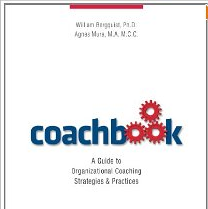
Click the red button at the bottom of the page to download the free sample chapter. Click the cover image to the right under Our Sponsors to purchase the entire book in paperback by Agnes Mura and Bill Bergquist.

Organizational Coaching comes in many forms and is called many names. We propose that three strategies and more than a dozen specific models of organizational coaching have been found to be most effective in addressing the challenges of 21st Century organizations. Thoughtful discussions about organizational coaching and research projects that focus on the outcomes of coaching must begin with clarity regarding terms being used and differing assumptions underlying the use of specific terms.
We wish to contribute to this process of clarification by offering our own taxonomy of organizational coaching practices (download attached to see Table One). We propose that one of the three strategies and three of the coaching models relate specifically to a client’s performance-engendering behavior. (cf. Goldsmith, 2000; Whitmore, 2009) We have labeled this strategy “Behavioral coaching” and the three specific models pertaining to this strategy: engagement, empowerment, and opportunity coaching.
A second strategy and three of the models relate specifically to the decision-making processes in which the client engages. (cf. Freas, 2000; Goss, 1996) We have labeled this strategy “Decisional coaching.” The three models associated with this strategy are: reflective, instrumented and observational coaching.
A third strategy, “Aspirational coaching,” relates to the personal values and aspirations that are held by the person being coached. This form of organizational coaching is typically engaged through one or more of four models: philosophical coaching, ethics-oriented coaching, career coaching, and spiritual coaching.
Cognition, Affect and Conation
Placed in a psychological context, the three strategies—Behavioral, Decisional, and Aspirational coaching—can be differentiated from one another by the predominance in each strategy of one of psychology’s three domains of attention: cognition (thinking), affect (feeling) and conation (behavior). While Behavioral coaching tends to focus on the behavioral (conation) aspects of the client’s life and work, Decisional coaching focuses on the decisions (integration of cognition and affect) that underlie this behavior. Similarly, Aspirational coaching focuses on the relationship between the actions taken (conation) and values (affect) held by the client. Each of these strategies will ultimately generate integrated action outcomes that serve the organization and the individual learner. This phase of the coaching process will relate the client’s explicit goals and objectives (cognition) and the steps to be taken on behalf of these goals and objectives (conation).
Download Article
















